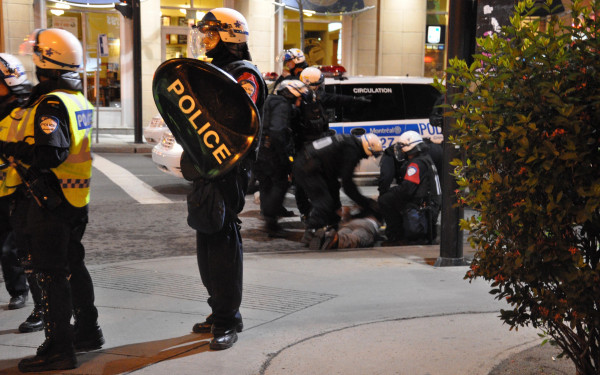Montrealers United Against Mubarak
Rally in Solidarity With Egyptian Demonstrators
As thousands continued to clash with riot police in the streets of Cairo Friday, nearly 200 protesters stood outside Montreal’s Egyptian consulate calling for the country’s president to step down.
Widespread demonstrations began on Jan. 25 in Egypt, when thousands marched through Cairo demanding an end to Hosni Mubarak’s presidency—a 30-year regime marked by political violence, high unemployment and food price inflation.
“This is the moment we have been waiting for for 30 years,” said Montreal resident Yassir Shoukry, whose family is still living Egypt. Shoukry lost contact with them on Thursday after Egyptian authorities disabled the country’s wireless communications and Internet access.
“The government cut [communications] because they are preparing for attacks on the protesters […] but the people cannot stop, you can’t win freedom without bloodshed,” he continued.
Shortly after the Internet blackout, violence erupted in and around Cairo. Police began using live ammunition to subdue demonstrators, causing the deaths of over 100 people across Egypt.
Ala Aldin emigrated from Egypt five weeks ago, but his mother and sister remain in Cairo. He has not heard from them since the uprising began.
“The last thing they told me was there is a great revolution happening in the streets,” he said. “It’s terrifying and I cannot stop worrying about their safety. We just want to be human, to have elections, to eat.”
The Egyptian uprising came after weeks of demonstrations in Tunisia brought down President Zine al-Abidine Ben Ali’s autocratic government. The success of the Tunisian revolution sparked a wave of unrest throughout the Arab world as mass protests were staged in Jordan, Yemen, Lebanon, Saudi Arabia and Egypt.
The Montreal rally was one of many organized across Canada as hundreds in Toronto and Ottawa also marched in solidarity with the people of Egypt.
Demonstrators outside of Montreal’s Egyptian consulate on Friday were hopeful that if Mubarak’s government fell, upheaval would spread throughout the region.
“Tunisia was the beginning,” said Hussein Youssef, who also has family in Egypt. “We’re going to see a domino affect here. People want democracy and I wish them the best.”
In Cairo and Alexandria, protesters now number in the hundreds of thousands. Police have reportedly abandoned certain neighborhoods altogether as massive amounts of looting and unrest continued to spread throughout the country last weekend.
Although tanks entered the city streets and fighter jets circled above, the military’s role in the fight for Egypt remains ambiguous. Soldiers were called in to disperse crowds, but in many cases their actions were ineffective and some have even shown public signs of solidarity with protesters.
“We just want to be human, to have elections, to eat.”
—Ala Aldin, protestor
“Who are the soldiers?” asked Fehr Marouf at the Montreal protest. “The soldiers are the people and they don’t want to shoot down their brothers and sisters.”
Responding to the calls for him to step down, Mubarak fired his entire cabinet on Friday. But for those attending Montreal’s protest, nothing short of a resignation would suffice.
“Mubarak needs to go,” said Youssef. “I lived under his regime for most of my life. You could not express opinions, you lived in fear of being beaten or jailed. Egyptians were treated like animals. He needs to go so that we can hope for people to eat, to elect their leaders, to have dignity.”
On Sunday, hundreds of members of Egypt’s leading Islamic party, the Muslim Brotherhood, escaped a prison in Cairo, leading many to fear that the fundamentalist group will seize power if Mubarak is deposed.
“The Muslim Brotherhood didn’t initially support this revolution,” said Marouf. “This is about the people who united as both Christian and Muslim. It’s much bigger than a group of fundamentalists.”
This article originally appeared in Volume 31, Issue 21, published February 1, 2011.

__900_598_90.jpg)


_1_600_375_90_s_c1.jpg)
__600_375_90_s_c1.jpg)
2_600_375_90_s_c1.jpg)
